'Til death do us part: Marriage destroyed by war
December 29, 2012 -- Updated 1548 GMT (2348 HKT)
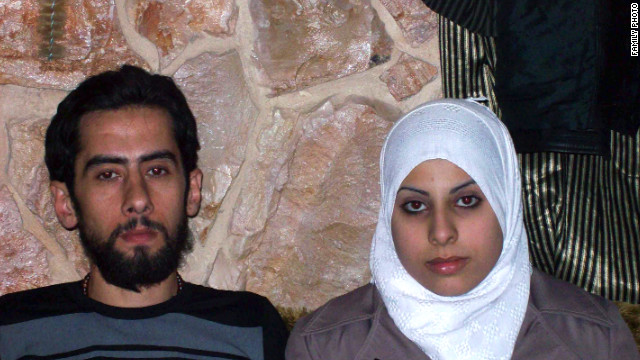
Mohammad Jumbaz and Ayat Al-Qassad were expecting their first child when Ayat was killed.
STORY HIGHLIGHTS
- 18-year-old newlywed Ayat Al-Qassab was recently killed by rocket in Syria
- Ayat and her husband saw their marriage as act of defiance against al-Assad
- Her family considers her a martyr
He does not cry or wail.
"I thank God this is my
third martyr: Ahmed, Abdullah and now her. I thank God, and I will not
say anything against his fate," Mahmoud told an activist filming the
small funeral.
Just a few months ago,
18-year-old Ayat Al-Qassab sang and danced with her mother and aunts as
they dressed the bride in her wedding gown. Now, her shattered and
bloodied body lies in a grave below the crumbling, bullet-ridden
buildings of Homs.
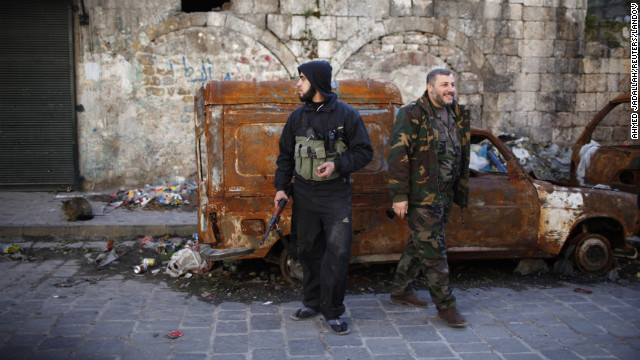 Photos: Showdown in Syria
Photos: Showdown in Syria
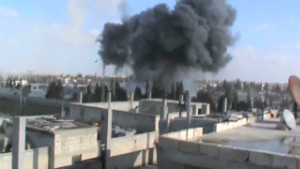 Where things stand in Syria
Where things stand in Syria
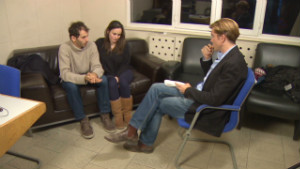 Escaping Syria to marry
Escaping Syria to marry
"She was killed and she
took my heart, my soul, my mind and everything with her, but we will not
give up. We will not retreat. We must keep moving forward,"
husband-turned-widower Mohammad Jumbaz said quietly.
Ayat did not lead battles or chair diplomatic talks. She is just like many other Syrians -- young, hopeful, and now dead.
"There was no daughter like her. She was bright and beautiful and playful. Then the siege happened and with it her destiny," Aisha Al-Qassab, Ayat's mother, said as tears streamed down her face.
Ayat and Mohammad recently found out they were expecting their first child. The new family was elated, even as UNICEF estimates that 2.5 million people, including many children, are affected by the violence and instability in Syria.
"My love, she was only married a few months, then pregnant and now a martyr," Ayat's mother said.
A 120 mm rocket fired
into the family home struck Ayat in the head, killing her and her
unborn child instantly. Ayat's father, who was standing nearby, was hit
in the shoulder and wounded.
"The week before she
died, a rocket attack injured her hand, and I had this feeling in my
heart that it was a sign. It was as if God gave us just one more week to
take her in and say goodbye," Mohammad said.
Young, defiant and in love
Brave and defiant, Ayat hardly spoke of the frivolities of bridal gowns and wedding cake.
"I wore a white dress,
but we did not have a traditional wedding because of this animal in
power," Ayat said in an interview shortly after getting married. "We
hope once the regime falls we can have a wedding, because our happiness
is the end of this government."
Although Ayat and Mohammad married just a week after meeting, the two were in love, her mother said.
"She was young, and I
had not planned on her marrying, but the siege brought her destiny. A
young hardworking man liked her and she saw him and he saw her and they
fell in love and got married," Aisha said, shaking her head as if trying
to forget.
The newlyweds saw their marriage as a symbol of the resistance against Syrian President Bashar al-Assad.
For Mohammad, the
part-time rebel fighter, revolution remained his shield, but the young
man also believed living and loving was the greatest defiance of all.
"She was wonderful. We
were newlyweds and we were happy. Even if she upset me I could not be
mad at her. Her gentleness captured my heart and I pray that God opens
the gates of heaven for her," he said, cracking a tiny smile as he
remembered his wife.
Guns and battles are far
from Mohammad's true passion: baking sweet desserts. The young pastry
chef loves making indulgent treats for Homs' fighters, families and
children.
"When I give a family
sweets, it is as if I am handing them a treasure," he said as he laughed
loudly for the first time, thankful for the power of a single cookie in
a city ravaged by war.
Ayat shared Mohammad's
delight for delivering glimpses of joy through pastries drizzled with
sweet "ater" or syrup, even as gas, flour, sugar and milk were in short
supply.
"She loved sweets, and
more than that, she loved to watch me make them. We had even made date
cookies and she died before she could eat them, so we gave them away,"
Mohammad said, still smiling.
A childhood cut short
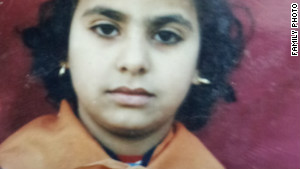
Ayat Al-Assab was the third of five children.
Ayat was born and raised
in the Old District of Homs, Syria's third largest city. Her father was
a laborer and her mother stayed at home with the kids, instilling in
her the value of hard work and family. The third of five children,
Ayat's two older brothers spoiled the brown-eyed girl while the two
younger siblings depended on her care.
"She loved to study and she would always study. When the siege happened there were no schools left open," Ayat's mother said.
More than 2,000 schools have been damaged or destroyed in civil war-related violence, and about 600 schools serve as makeshift shelters for internally displaced people, according to the Syrian government.
"She loved to help me with the housework, but I would not let her. I wanted her to study," Aisha said.
The western city of Homs
relies largely on industrial jobs. For Ayat's family, education
provided an opportunity for their children to escape manual labor in a
country where the average monthly salary is $300.
"She wanted to be an
expert in Sharia law -- maybe she could have even got her Ph.D. if she
got good grades, but God did not plan this for her," Aisha said.
War and marriage
The Syrian uprising
sparked by revolts across the Middle East forever changed Ayat's country
and transformed Homs into a bastion of resistance against al-Assad's
government.
"(Ayat) grew up on the
love of God and when the demonstrations started she fell in love with
the revolution and was very proud of her brothers who fought and died
for freedom," Mahmoud said.
Revolution morphed into a
full-scale civil war, consuming every corner of the beautiful country
in a bloody and relentless fight for power. Amid a stifling siege on
Homs, where the Syrian Army regularly blocked food, medicine and
supplies, Mohammad and Ayat got married.
I would prefer my honeymoon to be here amid the bombs and shells than for me to abandon my nation.
Ayat Al-Assab
Ayat Al-Assab
"I am very happy here
with my life. Here our life is better than a honeymoon outside our
country. We are not like the people who fled. Here we have our pride and
we are defending our nation. I would prefer my honeymoon to be here
amid the bombs and shells than for me to abandon my nation," Ayat told
CNN earlier this year.
But as the bitter winter
cold and intensifying government shelling added another dimension to
the struggle for survival, Ayat began fearing for her life and the life
of her unborn child.
"She began to get very
scared, and every time she would hear a plane fly overhead she would
become afraid," Mohammad recalled, "but she never asked to leave Homs.
The opposite -- she was proud to stay, and I thank God for her
martyrdom."
In Islam, martyrdom is a
high honor granted by God to those who die fighting for their religion,
country or rights of their community. Muslims believe a martyr is
destined for heaven, so loved ones must celebrate rather than mourn
their death.
"God gave her parents
the patience to overcome the death of her brothers, and God gave me the
patience to overcome the death of my brother. God willing, he will grant
us the patience to overcome Ayat's death, too," Mohammad said.
After nearly two years
of conflict, more than 40,000 people have lost their lives. Syria sees a
steady stream of funerals for its so-called martyrs, where shrill cries
of joy compete with wails of pain in haunting processions for the dead.
As difficult as it seems
to rejoice over the death of a loved, the Islamic principle of
martyrdom is at its core about blind faith that those who died
righteously reside in a better place in the afterlife. It is a
conviction the family clings to when nothing else can explain the death
of a young, pregnant woman only a few months into her marriage.
"We had prayed that she would live and they would have children," Aisha said.
"And that we would become a grandpa and grandma, but God remembered her and he took her," her husband interjected.
"I pray that he destines us to martyrdom, too," Aisha added.
The family's near
impenetrable faith prevents them from protesting Ayat's fate, but by
accepting her death, the family must survive on memories of her life.
"I will remember everything about her. What more can I say? I will remember everything, everything," Mohammad murmured.
And with that, the family members bowed their heads and fell silent.

ไม่มีความคิดเห็น:
แสดงความคิดเห็น